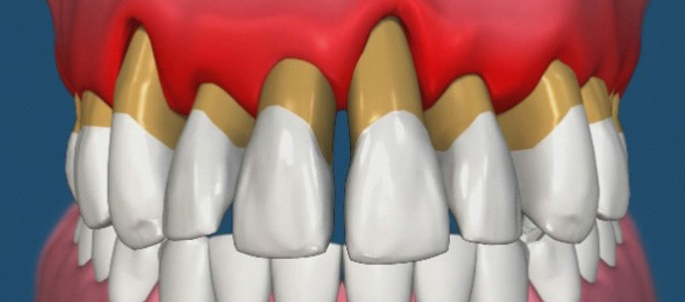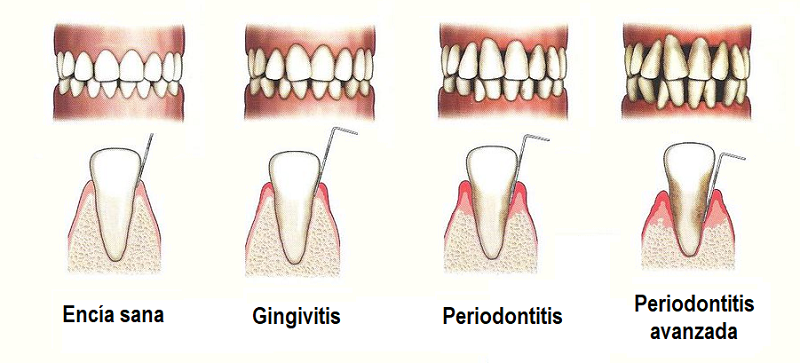PERIODONTICS
Periodontics in Puerto de la Cruz, Tenerife
PERIODONTICS
Periodontics is the branch of dentistry that treats diseases of the gums and the bone that supports the teeth and surrounding tissues.
Gum diseases such as gingivitis and periodontitis are among the most common causes of tooth loss, but they also have a major impact on general health and there is a growing body of research to corroborate this.
Periodontitis aggravates or increases the risk of diabetes, myocardial infarction, male impotence, premature births. Periodontitis is also associated with bacterial pneumonia, bronchitis, chronic obstructive pulmonary disease (COPD), lung abscesses and has recently also been studied for its influence on the onset of Alzheimer’s disease.

Periodontal diseases
The main periodontal diseases are GINGIVITIS and PERIODONTITIS.
Gingivitis
Gingivitis is the most common gum disease. It is due to the accumulation of bacterial plaque at the line where teeth and gums meet. Over time the plaque turns into a hard deposit, tartar, which irritates the gums. The bacteria and toxins that are produced infect the soft tissue producing gingivitis (inflammation of the gingiva or gum). It is important to treat it because it can also lead to periodontitis (pyorrhoea).
Periodontitis
The infection in this case reaches the bone, endangering the support of our teeth. If it is not treated, we can lose teeth and we also run the risk of the infection passing into the bloodstream and affecting other organs. There is a proven link between oral infections and cardiovascular problems and it would be a shame to let our heart suffer because we do not go to the dentist.
Peri-implant mucositis and peri-implantitis
We can say that it is the same as gingivitis and periodontitis but in the case that we do not have natural teeth but dental implants. In order for the implants to last in perfect condition, they must be cared for and daily hygienic care must be maintained. Because the implant does not have cavities but the gums can be damaged.
Symptoms of a diseased gum
1. Inflammation of the gums
Bright red, swollen gums.
2. Gingival recession
The gum recedes, revealing the root of the tooth and giving it a more elongated appearance.
3. Gaps between the teeth
We start to see gaps that were not there before, also due to the receding gums.
4. Tooth mobility
The teeth start to lose their grip and begin to move.
5. Halitosis
Permanent bad breath.
6. Increased sensitivity
Both teeth and gums are more sensitive to touch, cold and heat.
7. Gums bleed easily
When brushing, the toothbrush appears stained pink or when we spit out the toothpaste it has this colour because it is mixed with some blood.

Periodontal treatment
It is best to detect the problem at the gingivitis stage and control it with proper oral hygiene habits. Because when it becomes periodontitis, the treatment becomes more complicated and requires specific dental interventions, sometimes even oral surgery.
- Scaling and root planing (dental curettage): This is a deep cleaning. It consists of polishing the roughness of the roots of the teeth to reduce the accumulation of plaque and tartar.
- Periodontal flap surgery: This involves removing tartar from the pockets that form around the teeth. The gums are lifted to expose the roots and bone, allowing a thorough cleaning of the tooth surface to be carried out.
- Grafting: This involves the placement of bone and/or tissue grafts to replace infected tissues. This is done in more severe cases.
- Antibiotic treatment
Frequently asked questions
Yes, in the early stages of the disease. That is why it is important to go when we start to notice symptoms or to attend annual check-ups so that the specialist can diagnose us as early as possible.
The most important thing is to maintain proper dental hygiene to prevent periodontal disease. Brush your teeth twice or better three times a day (do not forget to brush at night) for two minutes and use dental floss and interdental brushes to get into the corners. Do not forget to brush your tongue.
It is important to attend the dental check-ups scheduled by the dentist and to have regular professional cleanings to remove plaque and tartar that cannot be removed by brushing.
The answer to the question of whether gum disease is dangerous is YES.
On the one hand, periodontitis can cause you to lose your teeth, but if this were not enough, it has been linked to cardiovascular and endocrine pathologies such as diabetes, male impotence, Alzheimer’s disease and also to problems during or as a result of pregnancy, among others. In general, periodontitis can, we do not know if it causes, but it can aggravate all of these pathologies.
If you have read this far it is likely that you have inflamed or irritated gums. Don’t hesitate, if you are in Puerto de la Cruz, at Artedental we will be delighted to attend to you and help you solve your problem. Artedental is your dental clinic in Tenerife.
